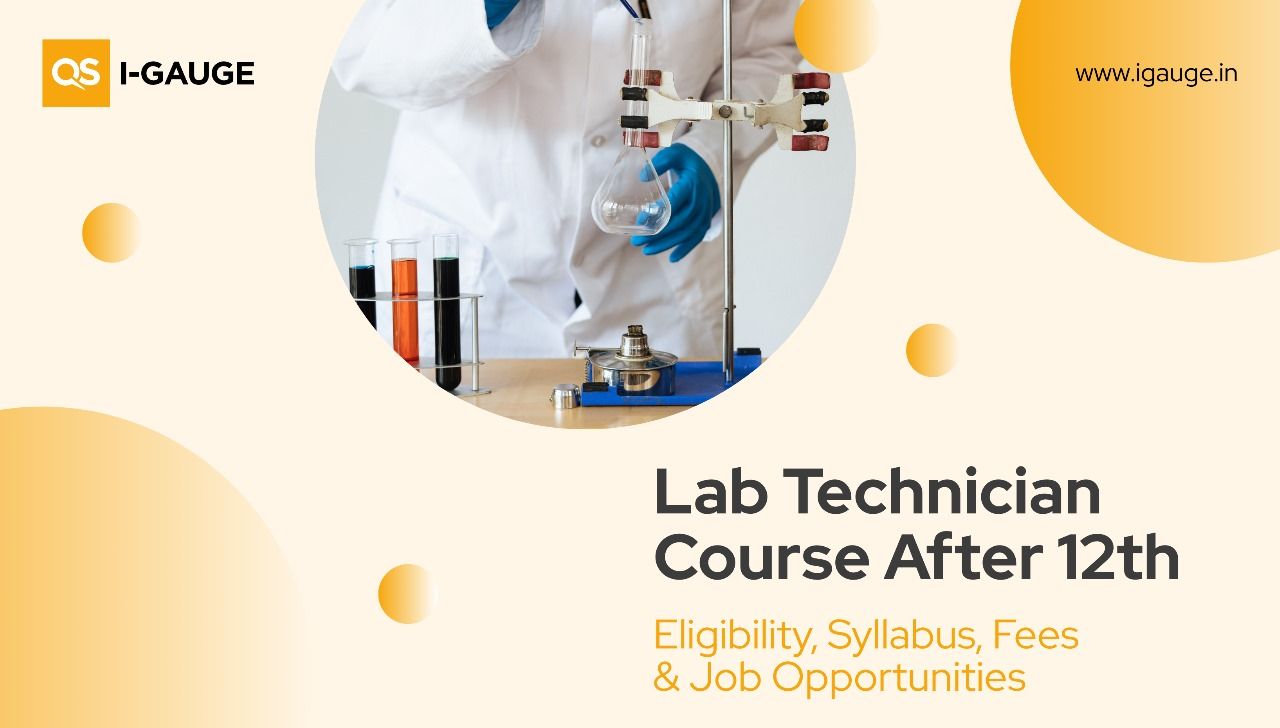
Your professional future depends on selecting the right career path following your 12th-grade studies. Medical professionals need lab technicians to conduct essential tests on patient samples, as these tests enable doctors to identify medical conditions and provide appropriate treatment. Students who wish to work in healthcare and science can consider becoming lab technicians for an exciting and fulfilling career.
What does a lab technician do?
Lab technicians work in hospitals, diagnostic labs, pathology centers, research facilities, and clinics. The laboratory team performs sample collection and analysis of blood, urine, tissue, and other bodily fluids through advanced laboratory methods and specialised equipment. Their exact procedures enable doctors to identify diseases and track patient responses to treatment, and perform medical studies. The work requires professionals to possess strong accuracy skills, technical abilities, and detailed work habits.
Eligibility criteria for the lab technician course after 12th
To enrol for this course, students must fulfil certain academic requirements and sometimes additional criteria depending on the institution.
- Educational Qualification: The primary eligibility is completion of 12th standard or equivalent from a recognised board.
- The candidates need to have completed their science stream with PCB (Physics, Chemistry, Biology) or PCM (Physics, Chemistry, Mathematics) subjects. The admission requirements for institutes include Physics, Chemistry, and Mathematics or Commerce with Biology, based on the specific course selection.
- The minimum score requirement for college admission typically stands at 50% or higher in the qualifying examination, according to most institutions.
- The candidate age range typically extends from 17 to 30 years, although individual institutions maintain their own specific requirements.
- The entrance exams serve as the primary admission criteria for science students who want to enrol in various institutes. The admission process at different institutes varies between 12th mark-based admission and science subject entrance exams, which include CUET UG, IPU CET, KCET, Jamia Millia Islamia Entrance Exam, and LPU NEST.
Types of lab technician courses
There are multiple formats of lab technician courses to suit different career goals and academic backgrounds:
The DMLT program delivers a 1–2-year educational program that unites academic learning with hands-on training.
Certificate Course: Short-term (6 months to 1 year) courses for quick skill acquisition.
Bachelor of Science in Medical Laboratory Technology (B.Sc. MLT) lasts 3-4 years for those wanting a more in-depth study.
Specialised Courses: Advanced certifications in microbiology, pathology, haematology, and other sub-fields.
Course Curriculum Highlights
The syllabus usually blends theory with lab practical and covers:
- Basics of Human Anatomy and Physiology
- Biochemistry and Molecular Biology
- Microbiology and Parasitology
- Pathology and Haematology
- Clinical Biochemistry and Immunology
- Lab Safety and Quality Control
- Use and Maintenance of Laboratory Equipment
- Practical Training and Internship
Fee structure for the lab technician course
The expenses for courses vary based on the particular program type and the academic reputation of the institution, together with its location. People can develop improved financial plans through their understanding of fees.
- The total cost of diploma programs at these institutions falls between INR 50,000 and INR 1,50,000 for the complete duration.
- The cost of certificate programs ranges between INR 20,000 and INR 60,000.
- The total fees for degree courses range from INR 1,00,000 to INR 4,00,000 based on both college and state institutions.
- Government colleges often have lower fees compared to private institutes.
- Some educational institutions require students to pay extra fees for practical laboratory work, study materials, and internship placement services.
Career Prospects and Salary
Upon completing a lab technician course, graduates can find employment as:
- Medical Laboratory Technicians in hospitals or diagnostic centres
- Pathology Lab Technicians
- Phlebotomists
- Research Assistants in medical or pharmaceutical labs
- Quality Control Technicians in drug manufacturing units
The healthcare industry's expanding diagnostics market segment provides trained laboratory technicians with a stable employment environment. The starting salary for new employees ranges between INR 2,00,000 and INR 4,00,000 per year, but specialised roles and management positions at the company pay higher salaries to experienced staff members.
Why choose a lab technician career?
Medical diagnosis accuracy and proper patient treatment delivery depend heavily on the essential role of laboratory technicians in healthcare settings. The healthcare and diagnostics sector shows rising demand, which creates new employment possibilities.
The field of medical science offers employment opportunities across various healthcare facilities, including hospitals and clinics, as well as research laboratories, pharmaceutical companies, and public health organisations.
The career path provides various advancement choices which enable professionals to choose between specialisation in their field, pursuing higher education, or taking on research and lab management responsibilities.
Conclusion
Students who wish to work in medical science laboratories after finishing their 12th year can find fulfilment through Lab Technician training. Students who want to select the correct program must learn about the eligibility requirements, course types, fees, and admission procedures. Medical laboratory technology provides job stability and healthcare industry growth opportunities to those who complete their training and establish a solid professional base.
Disclaimer
The blog is curated by referring to various credible sources and does not necessarily reflect the opinions or positions of QS I-GAUGE. The information provided is for general informational purposes only, readers are advised to conduct their own research and seek professional advice before making any decisions.




